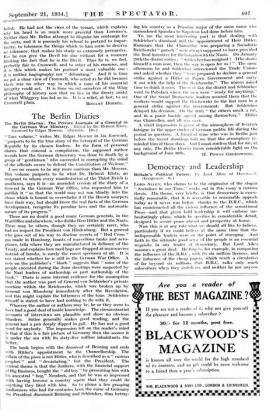Democracy and Leadership
Britain's Political Future. By Lord Allen of Hurtwool. (Longman. 6s.)
LORD ALLEN, who claims to be the originator of the slogan " Socialism in our Time," works out in this essay a curious thesis. His theme, very briefly, is that democracy is essen- tially reasonable, that it is accessible to reasonable appeals today as it never was before—thanks to the B.B.C., which has counteracted all the vicious influence of the sensational Press—and that given bold leadership it will endorse un- hesitatingly plans, which he specifies in considerable detail, designed to secure peace abroad and prosperity at home.
Now this is at any rate what we should all like to believe, particularly if we could believe at the same time that the indispensable leaders were on the point of emerging. And faith in the ultimate good sense of the people is an essential requisite in any leader of democracy. But Lord Allen assumes a great deal. He forgets, for example, in competing the influence of the B.B.C., with its six million licences, and the influence of the cheap papers, which reach a circulation of far beyond six millions, that B.B.C. talks only reach subseriberS when they switch on. and neither he nor anyone
else knows what percentage Of subscribers switches on for political speeches, or talks on popular economics. And when he asks " Is there no party or group of parties who will openly say what the vast majority of us really think ?," or declares his belief that " nearly all thoughtful and public-spirited men and women have now been won over to desire the same thing," or affirms that " most experts are agreed as to what the remedies should be which could preserve the world from anarchy," he is assuming a degree of unity on things in general for which such tests as it is possible to apply furnish little warrant.
Lord Allen is an impenitent Socialist, and he pleads earnestly for the inclusion of Socialists in his projected Government of Action. But the achievement of Socialism means the destruction of Capitalism and it is a little doubtful how far avowed believers in Capitalism would strike an alliance with Socialism for such an end—or even for national control of the banking system and the establishment of a national investment board, which for Lord Allen are essential conditions of the creation of the new order on which his eyes are set. He has a way, moreover, of assuming immense legislative or adminis trative developments in half a dozen facile lines—e.g., " What we have to do is to capitalize the recovery in the first years of the upward trend. We must eliminate waste by co-ordinating industry, and then assist it by easy credit ; we must make a rapid transfer of expenditure from the dole to new forms of *age employment through schemes for housing and the recon- ditioning of the countryside ; we must adopt a still more expansionist monetary policy to secure the reduction of hours so that the whole population may be employed and consuming power increased. All this will intensify the speed of recovery."
The fact is that to Lord Allen the reasonableness of the schemes he envisages is so clear that he cannot imagine any reasonable men (and most Englishmen are reasonable men) opposing them. His policy is the policy of all sensible men. So, in many respects, it should be. That is quite intelligible. The case he makes, for example, for an international collective
system with all its implications, or for a reform of Parlia- mentary procedure, is convincing. And the absence of leadership is catastrophically patent. But facts are facts, and the plainest of them is that the unity Lord Allen postu- lates is not there. Though in one sense we were all Socialists in Sir William Harcourt's time, in the essential sense we are not all Socialists yet—by a long way. But no book which discusses the fundamental political issues of the moment so earnestly and sincerely (though with some excess of optimism) as. this can fail to provoke salutary reflec- tion. It is by no means necessary to accept all the writer's conclusions. It is well worth while to study all his contentions.







































 Previous page
Previous page